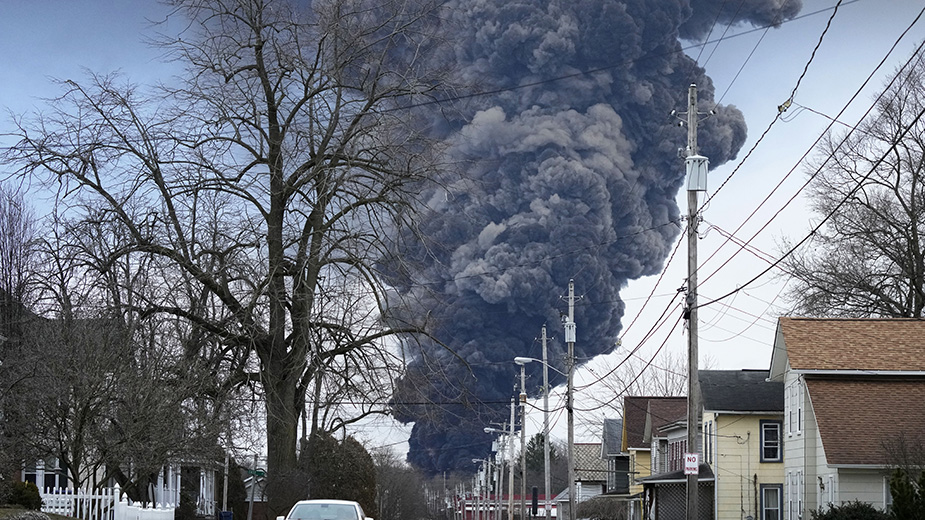Legal Strategies: Norfolk Southern Derailment Update
By Nils P. Johnson Jr.
Johnson & Johnson Law Firm
EAST PALESTINE, Ohio – On Feb. 3, 2023, 38 of 149 railcars of a Norfolk Southern train derailed in East Palestine.
The accident was caused by the failure of a wheel bearing in car 23, which was a hopper car carrying plastic pellets. The hot bearing caused the axle to heat up, which ignited the pellets. Traveling though Columbiana County, the train passed three “wayside detectors,” which serve to provide warnings of a problem to Norfolk Southern. The detectors showed the build-up of dangerous temperature levels. When the train conductors finally applied the brakes, the axle of car 23 failed and the train derailed.
Some older tank cars carrying hazardous chemicals breached and a fire resulted, to which firefighters responded and mitigated. Several days later, as some fires continued at a relatively low level, a decision was made to vent and burn five more modern tank cars carrying vinyl chloride that had survived the crash intact. Norfolk Southern contended this was warranted by a temperature increase in one of the five cars, believing the temperature increase to be evidence of the car’s contents undergoing a dangerous, possibly explosive chemical reaction.
Though only one car of vinyl chloride appeared to be increasing in temperature, all five cars were vented and burned on Feb. 6, creating a conflagration of over 115,000 gallons of vinyl chloride monomer, a liquefied, compressed flammable gas. This caused an enormous black, viscous plume that traveled miles from the site and across state lines into Pennsylvania and West Virginia. Runoff spilled into local creeks and killed thousands of fish; agricultural animals perished.
After the burn, many area residents complained of breathing difficulties, skin irritation and other ailments. The byproducts of burning vinyl chloride and the other chemicals involved include hydrogen chloride, phosgene gas (used by the Germans on the British in World War I) and various volatile organic compounds, as well as dioxin. Thus, the community generally suffered from anxiety, not knowing the effect of these chemicals on themselves, their children, their property values and local jobs. Moreover, many residents incurred expenses and aggravation in being forced to leave their homes for nearly a week, only to return to houses that had not been tested for safety.
As a result, dozens of class action lawsuits were quickly filed by plaintiff law firms from around the country. U.S. Judge Benita Pearson ordered the suits to be consolidated and appointed four large national law firms to act as lead counsel in pursuing class action status and claims. Attorney Nick Amato and I were named by the court as community liaisons between the team of plaintiff attorneys and persons affected by the derailment who may end up participating as plaintiff class members.
Recently, Norfolk Southern filed a motion to dismiss the consolidated class action complaint. In this filing, Norfolk Southern contends the claims for negligence, nuisance and strict liability are preempted by federal law. Here, Norfolk Southern contends that, because an existing body of federal laws governs both railroad operation and the transportation of hazardous materials, state laws (such as negligence, nuisance and strict liability) are inapplicable or pre-empted by the federal laws. In this, Norfolk Southern attempts to escape liability for the derailment with a shield made from a patchwork of federal laws concerning railroads. Inherent in this argument is Norfolk Southern’s position that such laws are wholly comprehensive (they are not), that such laws regulate every aspect of possible liability here (they do not), and that Norfolk Southern unwaveringly adheres to such laws (they do not).
Many of these themes were the subject of the National Transportation Safety Board’s two days of hearings at East Palestine High School. The first day featured extensive testimony concerning the decision to breach the vinyl chloride cars.
Norfolk Southern contended that it could not easily move the cars and that siphoning out the vinyl chloride content would have taken days. Norfolk Southern contractors reported being afraid that a poly-merization reaction was occurring that might cause a violent explosion. Norfolk Southern and its contractors presented this fear to the governor and fire chief, who, under these pretenses — and the belief that the burning should be completed before nightfall for atmospheric reasons — were given only minutes to decide.
The company that manufactured the vinyl chloride testified next. Its representatives indicated being contacted several times by Norfolk Southern and its contractors in the hours leading up to the decision to vent and burn the cars to better understand if the vinyl chloride could be undergoing a polymerization reaction. Each time it was contacted, the chemical company gave the same answer: its representatives did not believe the contents were undergoing a polymerization reaction.
Subsequent expert testimony explained that the vinyl chloride was wholly stabilized for railway transportation purposes by affirmatively removing oxygen from the chemical in its manufacturing process. In other words, only by adding oxygen to the monomer would it undergo a polymerization reaction. Exposure to heat simply would not cause a polymerization reaction to occur.
Despite this input, Norfolk Southern recommended all five of the cars be vented and burned. Norfolk Southern contractors candidly admitted that venting and burning are also frequently among the fastest methods to clear a set of tracks. A train passes through East Palestine on average every nine minutes.
The second day of NTSB hearings concerned the operation on the rail line of antiquated tank cars, the ones that burst upon derailment. The vice chairman of the NTSB panel remarked to the effect “those old cars should only be used to haul corn syrup.” Yet there are no federal regulations that require hauling dangerous chemicals in modern, safer cars.
Unlike the airline industry, most regulations for railroad operations appear to have been developed and enforced, not by the federal government, but by the railroads and its trade organization. Several witnesses testified about other safety features that might be implemented in railroading to improve safety.
The railroad industry has resisted stricter regulation. Moreover, the NTSB pointed out that Norfolk Southern had drastically reduced the number of its employees over recent years and implemented inspection rules that reduced the time of per-car inspection before a train departs from three minutes to 30 seconds.
The second day of hearings also revealed the wayside detectors that picked up increasing temperatures – as the train passed from Leetonia, through Salem and Columbiana – delivered its signals, not to the train conductor, but to the Norfolk Southern Atlanta office. It turns out that on the day of the incident, the person on duty was working from home. Moreover, when the transmission came in, she was dealing with another train situation and did not communicate the temperature signal to the Columbiana County train conductor for some minutes. When the trainmen finally hit the brakes, the axle of car 23 had failed and the derailment occurred.
As community liaisons, attorney Amato and I are charged with following the litigation. We have partnered with the East Palestine Memorial Public Library to host meetings on Mondays from 3 to 5 p.m. to answer questions about the litigation and to receive community feedback. Links to more information, NTSB investigative items and other resources are available at JandJOhio.com.
Pictured: A black plume rises over East Palestine, Ohio, as a result of a controlled detonation of a portion of the derailed Norfolk and Southern trains Monday, Feb. 6, 2023. (AP Photo/Gene J. Puskar)
Copyright 2024 The Business Journal, Youngstown, Ohio.



